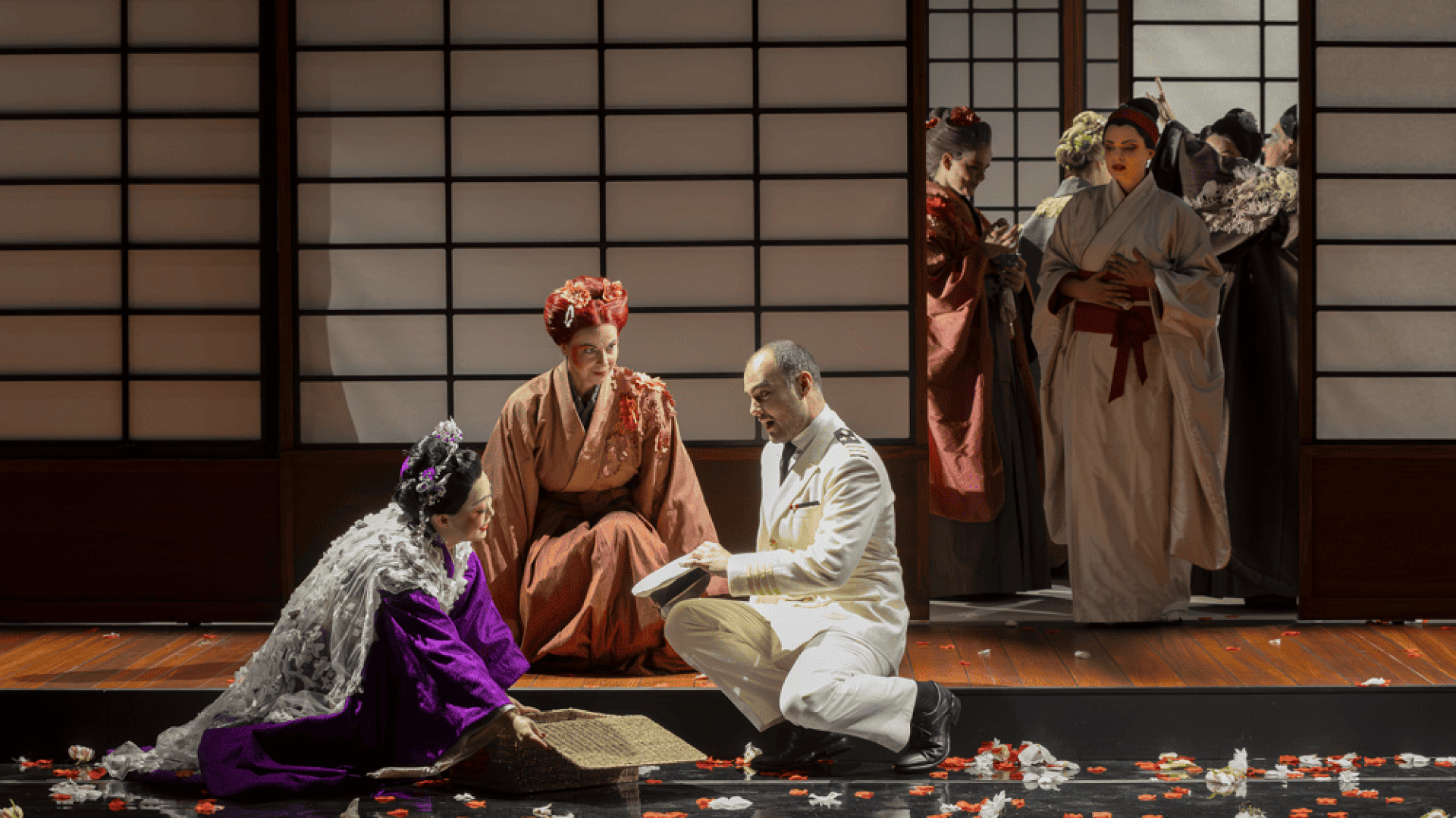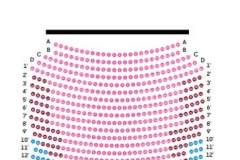Madama Butterfly
Mo | Tu | We | Th | Fr | Sa | Su |
Puccini's beloved classic in a guest performance by the Danish National Opera.
Madama Butterfly is performed in Italian with Danish supertitles.
Recommended for ages 15 and up.
Expected duration: 2 hours and 30 minutes incl. 1 interval
Synopsis
Act 1
In 1904, a U.S. naval officer named Pinkerton rents a house on a hill in Nagasaki, Japan, for himself and his soon-to-be wife, "Butterfly". Her real name is Cio-Cio-San (from the Japanese word for "butterfly" (蝶々, chōchō, pronounced [tɕoꜜːtɕoː]); -san is a plain honorific). She is a 15-year-old Japanese girl whom he is marrying for convenience, and he intends to leave her once he finds a proper American wife, since Japanese divorce laws are very lax. The wedding is to take place at the house. Butterfly had been so excited to marry an American that she had earlier secretly converted to Christianity. After the wedding ceremony, her uninvited uncle, a bonze, who has found out about her conversion, comes to the house, curses her and orders all the guests to leave, which they do while renouncing her. Pinkerton and Butterfly sing a love duet and prepare to spend their first night together.
Act 2
Three years later, Butterfly is still waiting for Pinkerton to return, as he had left shortly after their wedding. Her maid Suzuki keeps trying to convince her that he is not coming back, but Butterfly does not believe her. Goro, the marriage broker who arranged her marriage, keeps trying to marry her off again, but she does not listen to him either. The American consul, Sharpless, comes to the house with a letter which he has received from Pinkerton which asks him to break some news to Butterfly: that Pinkerton is coming back to Japan, but Sharpless cannot bring himself to finish it because Butterfly becomes very excited to hear that Pinkerton is coming back. Sharpless asks Butterfly what she would do if Pinkerton were not to return. She then reveals that she gave birth to Pinkerton's son after he had left and asks Sharpless to tell him.
From the hill house, Butterfly sees Pinkerton's ship arriving in the harbour. She and Suzuki prepare for his arrival, and then they wait. Suzuki and the child fall asleep, but Butterfly stays up all night waiting for him to arrive.
Act 3
Suzuki wakes up in the morning and Butterfly finally falls asleep. Sharpless and Pinkerton arrive at the house, along with Pinkerton's new American wife, Kate. They have come because Kate has agreed to raise the child. But, as Pinkerton sees how Butterfly has decorated the house for his return, he realizes he has made a huge mistake. He admits that he is a coward and cannot face her, leaving Suzuki, Sharpless, and Kate to break the news to Butterfly. Agreeing to give up her child if Pinkerton comes himself to see her, she then prays to statues of her ancestral gods, says goodbye to her son, and blindfolds him. She places a small American flag in his hands and goes behind a screen, stabbing herself with her father's seppuku knife. Pinkerton rushes in, but he is too late, and Butterfly dies.
Program and cast
Chunxi Stella Hu: Cio-Cio-San, Butterfly
Anders Kampmann: Pinkerton
Rhys Jenkins: Sharpless
Sofiya Palamar: Suzuki
Norbert Schmittberg: Goro
Andreas Winther: Bonze, Butterfly's uncle
Jens Jagd: Yamadori, prince
Estrid Molt Ipsen: Kate Pinkerton
The Royal Danish Theatre Old Stage
The Royal Danish Theatre (RDT, Danish: Det Kongelige Teater) is both the national Danish performing arts institution and a name used to refer to its old purpose-built venue from 1874 located on Kongens Nytorv in Copenhagen. The theatre was founded in 1748, first serving as the theatre of the king, and then as the theatre of the country. The theatre presents opera, the Royal Danish Ballet, classical music concerts (by the Royal Danish Orchestra, which dates back to 1448), pop stars, and drama in several locations.
The Royal Danish Theatre organization is under the control of the Danish Ministry of Culture, and its objectives are to ensure the staging of outstanding performances that do justice to the various stages which it controls.

 EN
EN DE
DE IT
IT FR
FR ES
ES RU
RU JP
JP RO
RO
 Seating plan
Seating plan 